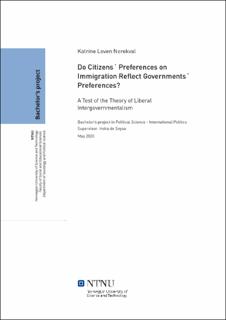Do Citizens´ Preferences on Immigration Reflect Governments´ Preferences? A Test of the Theory of Liberal Intergovernmentalism
| dc.contributor.advisor | de Soysa, Indra | |
| dc.contributor.author | Norekval, Katrine Loven | |
| dc.date.accessioned | 2020-07-07T16:02:30Z | |
| dc.date.available | 2020-07-07T16:02:30Z | |
| dc.date.issued | 2020 | |
| dc.identifier.uri | https://hdl.handle.net/11250/2661060 | |
| dc.description.abstract | The theory liberal intergovernmentalism argues that domestic preferences shape governments policy preferences. Liberal Intergovernmentalism has become one of the main theories in European integration theory but has also faced criticism. I find it interesting to test the assumption in the theory, in order to find evidence that can be used to strengthen or weaken the arguments in liberal intergovernmentalism. I use a survey from European Social Survey to look at citizens attitudes towards allowing immigrants to live in their country, and data from Eurostat (European Commission) to examine the number of granted citizenships in various EU member-states. The analysis shows that there is a statistically significant correlation between citizens´ preferences that are positive to allowing immigrants and the governments´ decision on the number of new granted citizenship. These data show evidence supporting the theoretical expectations from liberal intergovernmentalism. | |
| dc.publisher | NTNU | |
| dc.title | Do Citizens´ Preferences on Immigration Reflect Governments´ Preferences? A Test of the Theory of Liberal Intergovernmentalism | |
| dc.type | Bachelor thesis |
